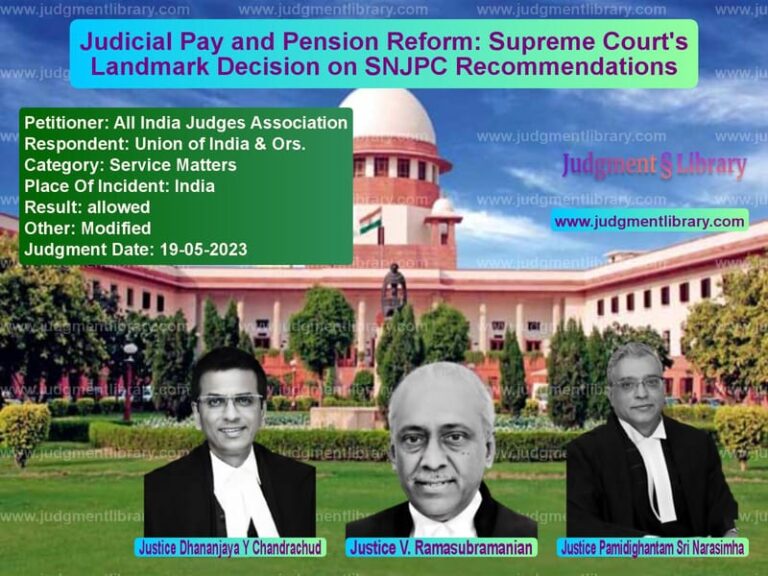Medical Negligence Allegations Overturned: Supreme Court Clears Doctors and Hospital
The case of Dr. Harish Kumar Khurana v. Joginder Singh & Ors. revolved around allegations of medical negligence leading to the death of a patient. The Supreme Court had to determine whether the hospital and doctors had failed in their duty of care or if the unfortunate death was a result of medical complications beyond their control.
Background of the Case
The appellants—Dr. Harish Kumar Khurana (anaesthetist), the hospital, and the New India Assurance Company—challenged the order of the National Consumer Disputes Redressal Commission (NCDRC), which had held them guilty of medical negligence and directed compensation of ₹17,00,000 with interest at 9% per annum.
The case originated from the treatment of Smt. Jasbeer Kaur, who was diagnosed with kidney stones. Initially, she was advised surgery in October 1996 but returned for treatment in December 1996, by which time her condition had worsened. The first surgery on December 9, 1996, was successful, but during the second surgery on December 16, 1996, she suffered a cardiac arrest and passed away a few days later on December 23, 1996.
Key Issues Before the Supreme Court
- Whether the doctors and hospital exercised due care in treating the patient.
- Whether the second surgery was necessary or conducted in haste.
- Whether the hospital was adequately equipped, including the availability of a ventilator.
- Whether the informed consent obtained was valid.
Arguments by the Appellants (Doctors and Hospital)
The appellants contended that:
- The first surgery had been successful, and the decision for a second surgery was taken after proper medical assessment.
- The patient’s condition warranted immediate intervention, and the risk was explained to her family.
- Anaesthesia was administered in the same manner as in the first surgery, but complications arose unexpectedly.
- They took all possible steps to resuscitate the patient and provided the best available care.
- The medical negligence claim was filed as a counterblast to the hospital’s demand for unpaid medical bills.
Arguments by the Respondents (Patient’s Family)
The patient’s family argued that:
- The hospital performed the second surgery too soon without waiting for proper recovery from the first operation.
- There was a recorded observation that the patient had “poor tolerance to anaesthesia,” which should have been taken into account.
- The hospital lacked adequate equipment, such as a ventilator, to handle complications.
- The informed consent was only obtained from the husband and not from the patient herself.
Supreme Court’s Analysis
The Supreme Court, comprising Justices Hemant Gupta and A.S. Bopanna, reviewed the medical records and the NCDRC findings.
Key Findings
- No Direct Evidence of Negligence: The Court emphasized that the claimants failed to provide expert medical evidence proving negligence.
- Cardiac Arrest Was an Unfortunate Event: The patient suffered a sudden cardiac arrest, which was an inherent risk of surgery and anaesthesia.
- Informed Consent Was Valid: The patient’s husband had given written consent, and the patient was aware of the risks.
- Equipment and Facilities Were Adequate: The hospital had a Boyle’s apparatus and oxygen support, and all necessary steps were taken.
Key Observations by the Supreme Court
“Every death of a patient cannot on the face of it be considered as death due to medical negligence unless there is material on record to suggest to that effect.”
“Principle of res ipsa loquitur is invoked only in cases where negligence is so obvious. Here, there is no such evident fault.”
Final Judgment
The Supreme Court ruled:
- The NCDRC’s decision was set aside.
- The compensation award of ₹17,00,000 was quashed.
- All appeals were allowed, and the doctors and hospital were cleared of all negligence charges.
Implications of the Judgment
This ruling has several significant implications:
- Higher Burden of Proof for Medical Negligence: Claimants must provide clear medical evidence to establish negligence.
- Protection for Medical Professionals: Doctors cannot be held liable for unforeseen complications if they have exercised due care.
- Ensuring Fair Trial for Hospitals: Consumer forums must rely on expert medical opinions before ruling on complex medical negligence cases.
Conclusion
The Supreme Court’s ruling in Dr. Harish Kumar Khurana v. Joginder Singh reaffirms that medical negligence claims must be backed by solid evidence. The judgment protects medical professionals from unfair liability while ensuring that genuine cases of negligence are distinguished from unfortunate medical outcomes.
Petitioner Name: Dr. Harish Kumar Khurana.Respondent Name: Joginder Singh & Ors..Judgment By: Justice Hemant Gupta, Justice A.S. Bopanna.Place Of Incident: New Delhi.Judgment Date: 07-09-2021.
Don’t miss out on the full details! Download the complete judgment in PDF format below and gain valuable insights instantly!
Download Judgment: dr.-harish-kumar-khu-vs-joginder-singh-&-ors-supreme-court-of-india-judgment-dated-07-09-2021.pdf
Directly Download Judgment: Directly download this Judgment
See all petitions in Medical Malpractice
See all petitions in Judgment by Hemant Gupta
See all petitions in Judgment by A. S. Bopanna
See all petitions in allowed
See all petitions in Quashed
See all petitions in supreme court of India judgments September 2021
See all petitions in 2021 judgments
See all posts in Civil Cases Category
See all allowed petitions in Civil Cases Category
See all Dismissed petitions in Civil Cases Category
See all partially allowed petitions in Civil Cases Category







